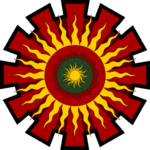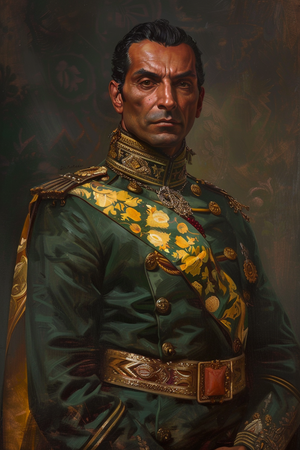Mahaan Maaran
| Mahaan Maaran Mahaan Maaran | |
| Flag | Coat of arms |
|---|---|

|

|
| Motto: tbc | |
| Anthem: tbc | |
| Locator map | |
| File:Mahaan Map.png | |
| Capital city | TBC |
| Largest city | TBC |
| Official language | TBC |
| Other languages | TBC |
| Ethnic group | Janta - Other |
| Religion | Anur |
| Demonym(s) | Mahaani |
| Government | |
| Government Type | Unitary Republic |
| President | Kushal Prakashne |
| Chancellor | tbc |
| Legislature | Congress of Great Mahaan |
| Establishment | |
| tbc | tbc |
| Area | |
| Total | 2,500,000 km2 |
| Water % | 5.6% |
| Population | |
| Total | 50,000,000 |
| Density | 20.0/km2 |
| Economy | |
| Economy type | Capitalist |
| GDP (total) | Ꞡ 1,250,000,000,000 |
| GDP per capita | Ꞡ 25,000 |
| Currency | AnarianCoin.png (₳) |
| Inequality index | 25.5 |
| Development index | 0.875 |
| Other information | |
| Time zone | +3 |
| Driving side | right |
| Calling code | +42 |
| Internet code | .ar |
| Nation number | 00 |

Maahan Maaran, also known as Great Maaran, proudly stands as a bastion of strength and resilience along the eastern coast of Raia, overlooking the vast expanse of the Phasian Ocean. At its helm reigns President Kushal Prakashne, a figure revered for his unparalleled intellect as the Scholar of the highest sciences, his unwavering commitment to fairness as the Grand Arbiter of justice, his visionary foresight as the Seer of the path forward, and his unwavering courage as the Marshall of the bravest.
History
The genesis of Great Maaran's modern era traces back to the tumultuous High Monsoon of the High Tyrial Revolution in 7668, a defining moment that witnessed the overthrow of the Ithrieni-backed monarchy. In the aftermath of this transformative upheaval, the nation found itself under the governance of successive military-backed regimes. From 7668 to 7673, a transitional junta steered the course of the nation until the long-awaited democratic elections of 7673 ushered in a new era of governance.
The electoral landscape of 7673, while marred by allegations of injustice from foreign observers, saw the participation of three political parties. Notably, President Kushal Prakashne, representing the Common Prosperity party, clinched victory with an overwhelming majority of 73 percent. A former military colonel who had resigned to contest the elections, President Kushal ascended to the presidency, swiftly filling the legislative halls with loyalists and military officers.
However, the euphoria of democratic transition soon gave way to a wave of reprisals orchestrated by President Kushal against minorities in the highlands and southern cities, perceived as voting against him. Across various provinces, arrests became commonplace, with many facing accusations of treason against the state. Thus, the dawn of democracy in Great Maaran was clouded by the shadows of authoritarianism and discord.
As President Kushal tightened his grip on both the military and the nation, the once-vibrant legislative body dwindled into irrelevance, reduced to a mere rubber stamp for his decrees. Members of the legislative who dared to oppose or question the president's authority found themselves swiftly disappearing or facing arrest, their vacant seats promptly filled by handpicked replacements loyal to the president and his regime. These new appointees, largely obscure figures with little influence or autonomy, became mere puppets in the hands of the president and his apparatus.
Simultaneously, Great Maaran retreated further into isolation, driven by a deepening paranoia of external threats, particularly the Ithrieni, whom many perceived as imperialist aggressors. Internally, suspicions ran high, with minorities and government officials alike viewed as potential traitors. The ascendance of orderist neighbors to the northeast only exacerbated this climate of fear, fueling purges within the government and fostering a pervasive atmosphere of distrust and surveillance.
In a bid to consolidate his power and stave off perceived threats, President Kushal resorted to drastic measures, including the expropriation of foreign business interests and the curtailment of civil liberties. This heavy-handed approach drew swift condemnation from the international community, resulting in a barrage of sanctions that further isolated Great Maaran on the global stage.
As economic woes deepened, exacerbated by the lack of strategic imports and dwindling foreign currency reserves, President Kushal resorted to desperate measures. Foreign currency reserves were hoarded within the confines of his own palace, ostensibly to safeguard against theft by corrupt officials but, in reality, serving to fund his control apparatus and personal coffers. Accusations of corruption and imagined crimes became commonplace, with individuals from all strata of society falling victim to arbitrary arrest, torture, and execution.
The consequences of these actions reverberated throughout Great Maaran, plunging the nation into an abyss of economic despair and social unrest. With machinery supplies and fertilizer in short supply, food distribution and agriculture collapsed, leaving the vast majority of the population teetering on the brink of subsistence. In this grim reality, the military emerged as both predator and provider, exploiting the populace's desperation to extort food and goods for its own sustenance, further deepening the cycle of oppression and dependence.
In 7681, amidst the throes of national collapse, Great Maaran found itself at a crossroads when approached by Hergom, a distant yet formidable power. Despite harboring deep-seated distrust towards this expansionist and hostile nation, President Kushal recognized the stark choice before him: to either remain isolated and watch his rule crumble under the weight of internal strife and external threats, or to take a gamble and open dialogue with Hergom.
Opting for the latter, President Kushal embarked on a daring path, aligning Great Maaran with Hergom in a strategic partnership that promised salvation amidst the nation's dire circumstances. The immediate impact was profound, as desperately needed resources flooded into the beleaguered nation. Decrepit fields bloomed anew with an influx of fertilizer, while roads, power plants, and electric lines underwent rapid repairs facilitated by highly subsidized Wolgos machinery.
Moreover, the military, once on the brink of collapse, saw its stocks replenished and upgraded, reinstating a sense of pride and purpose among officers and soldiers alike. In exchange for this lifeline, President Kushal initiated the export of highly sought-after luxury goods to Hergom, along with offering prisoners as labor and granting permission for the establishment of naval and military bases on a small peninsula.
Yet, amidst this newfound alliance, President Kushal's paranoia remained unabated, as he navigated the delicate dance of feigned friendship with Hergom while grappling with his nation's increasing reliance on its newfound benefactor. Despite this, Hergom's indifference towards the internal affairs of Great Maaran served to bolster the president's rule, providing a semblance of stability in an otherwise tumultuous landscape.
For President Kushal, the alliance with Hergom offered not only a lifeline for his regime but also a strategic opportunity to expand his influence in the region and counter the hegemony of the Ithrieni in the Phasian. However, beneath the veneer of recovery, the nation remained gripped by paranoia and fear, with daily occurrences of torture, arrests, and executions perpetuating a cycle of oppression and control.
Nevertheless, amidst the pervasive atmosphere of propaganda and intimidation, the populace found solace in the alleviation of hunger and the gradual improvement of services and access to goods. In a nation teetering on the edge of collapse, the alliance with Hergom offered a glimmer of hope amidst the darkness, albeit shrouded in uncertainty and compromise.